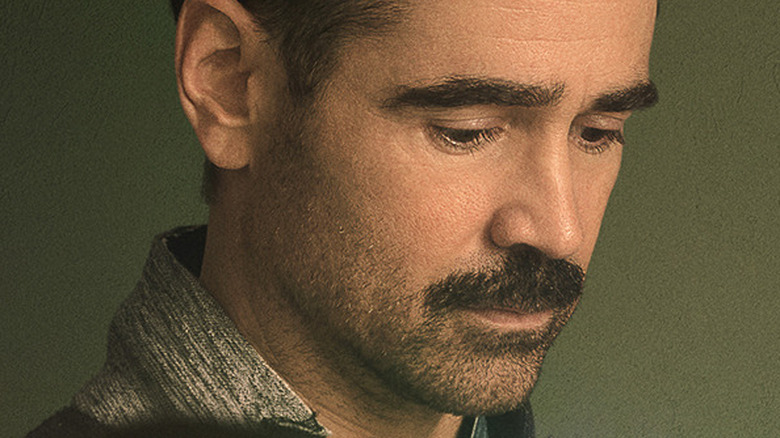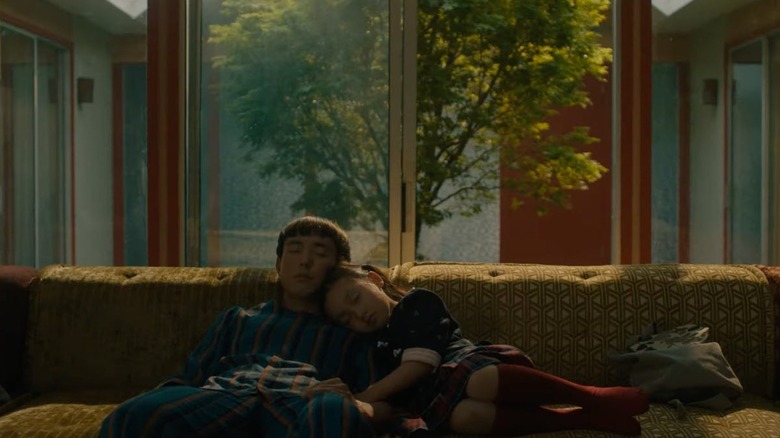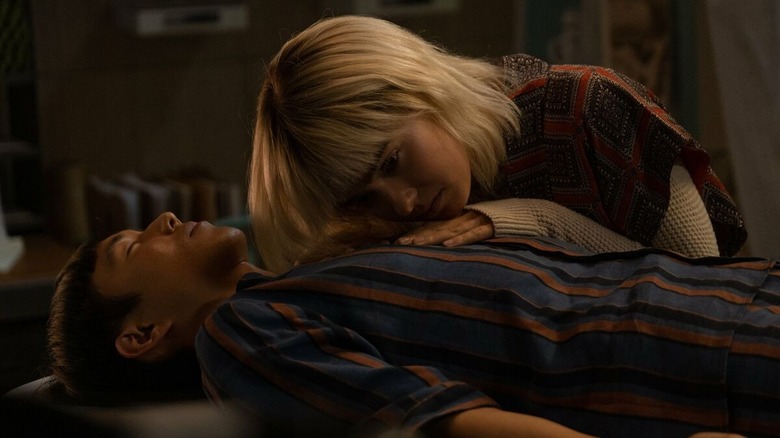After Yang Review: Love, Death + Robots
It all starts with a synchronized dancing contest, 30,000 families around the world lining up to take part in a competition where they get eliminated the second they fall out of sync. It's not exactly a subtle metaphor to introduce us to a meticulously crafted family unit where the gap between generations has been bridged via artificial intelligence, but it tells us everything we need to know. Jake (Colin Farrell) and Kyra (Jodie Turner-Smith) have engineered the perfect household, following all the steps they've been given to create the image of the idealized modern family to the wider world. This high-energy opening credits sequence stands apart from anything else within "After Yang," the tremendous sophomore feature from video essayist turned filmmaker Kogonada — a film that is in many ways about what happens when a family is no longer able to follow the carefully choreographed steps set out for them, and what they are only just realizing they've missed out on while trying to.
Stripped down sci-fi
Adapted from Alexander Weinstein's short story "Saying Goodbye To Yang," Kogonada's film is primarily about the evolution of grief in a technologically advanced world. He's made a deceptively small-scale drama where one family's tragedy opens up more existential questions about the very nature of our cherished memories in an age where everything is kept as a memento on our cell phones. Is our relationship to those we've left behind determined entirely by the memories we've created through the photos and videos that we've posed for — images as much for the wider world's benefit as ours? And does our need to create these artificial memories come at the odds of remembering the bigger picture, our thoughts of loved ones eventually replaced by all we have on our camera rolls as time progresses?
The family tragedy here is the death of Yang (Justin H. Min), an artificial babysitter initially bought to help adopted daughter Mika (Malea Emma Tjandrawidjaja) stay attuned to her own Chinese heritage. As she's grown up, she's been constantly fed information about her background and Chinese culture at large — all delivered in a register closer to that of a parent than a sibling, or even an educator. Because of their close relationship, Yang has increasingly been seen by the family as a second adopted son, and is slowly welcomed more into their close bonding time, up to and including the regular dance competitions we see in the opening. When Yang malfunctions one day, immediate efforts to repair him fail, and the family all have to reckon with how their relationships have changed, something which particularly affects Jake. Allowed to hold onto Yang's memories, he finds himself repeatedly diving in, recontextualizing his own memories and discovering that Yang had an equally rich existence before being bought by the family.
The central novelty of "After Yang" is that it's a film set in a world where artificial intelligence in the form of advanced humanoid robots is commonplace, yet achieves profundity through the way it makes us contemplate the realities of living without it. Kogonada separates us from the sleek, distinctively sci-fi future world he's created largely through budgetary necessities; underground highways that connect the family to the city, populated by driverless cars, are shown entirely from inside the vehicle, for example — limiting the audience's perspective of otherworldly creations that might otherwise distract from the emotional resonance. There's every suggestion that a "Blade Runner"-type future may exist in the margins, but the writer/director's focus is entirely on the human story at the core, and refuses to let you get distracted by the wider world. Not since Steven Spielberg's "A.I: Artificial Intelligence" has science fiction world-building existed entirely as a MacGuffin for an innately human story. And here, Kogonada even flips the stereotypical narrative about a robot developing consciousness, with the lessons about what it means to be human taught entirely to the grown man facing up to the loss of his family's artificial babysitter.
Before Yang
Beneath the humanism is a sharper social commentary, although Kogonada's emotionally gentle approach to storytelling means that this doesn't quite provoke or even contribute toward the existential conflicts in the way the first act perhaps hints at. "After Yang" is a film about navigating identity, with Mika only truly coming into contact with her cultural heritage as a result of being left with an android babysitter by two overworked (and crucially, non-Chinese) parents very rarely at home. Yang has, of course, never set foot in China, and similarly to Mika, his only connection to the country is an endless string of fun facts he spews out like a walking Wikipedia. When Jake looks through Yang's memories later on, revisiting moments both treasured and overlooked from differing perspectives, he comes to understand the gravity of Yang's disconnection from a country he'd never visited, but was programmed to know everything about — a disconnect that it becomes apparent registers for everybody in the family, in different ways. It's a powerful revelation, and even better, it reveals itself during the same scene Colin Farrell unleashes a pitch-perfect Werner Herzog impression out of nowhere.
Kogonada's 2017 debut, "Columbus," was similarly a tale about the relationship between personal identity and the surrounding cultural backdrop. In that case, it was a story about an architect (John Cho) and a librarian (Haley Lu Richardson) who meet and bond while navigating Columbus, Indiana, a city renowned for its unusual modernist architecture, their discussions about their surroundings leading them to open up more about their personal lives. "After Yang" is a natural extension of this theme, using a minimalistic science fiction conceit to further unpack the relationship between memory and identity; whether we are defined by a specific cultural upbringing, or the smaller moments of connection along the way.
Haley Lu Richardson has reunited with Kogonada for his sophomore feature, appearing at the halfway point as Ada, a clone who Jake sees in Yang's memories from before he joined the family. Ada and Yang shared the kind of relationship reserved for human friends or partners, and not those created artificially. This strand of the narrative might be the only place where "After Yang" feels less interesting thematically; there's some intriguing science fiction world-building introduced (for some reason, in this world where AI is everywhere, there's prejudice towards clones), but witnessing this key to Yang's past life doesn't feel as emotionally revelatory as exploring his own memories since being with the family. The film is called "After Yang" — we don't need to spend this much time looking back to what came before his arrival.
But this is only a minor criticism of what is otherwise an exceptional second feature from Kogonada, that builds upon the promise of his debut as it confidently moves his thematic interests into the realm of science fiction with ease. It's the best film released in 2022 so far.


